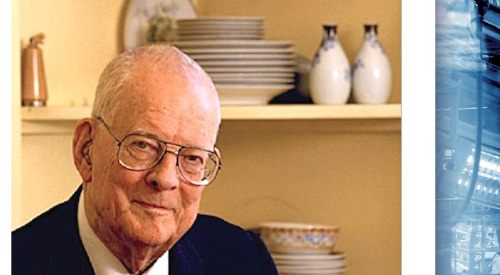With the exception of me, not many people in the building industry still quote quality expert Dr. W. Edwards Deming. But then I have long been accused of being out of step with the accepted wisdom of home building — a label that I treasure.
I had the extreme good fortune of getting to know Dr. Deming during my days as the one and only home building member of the Detroit Deming Study Group. Deming met with the Detroit group once a month at the Farmington Hills Holiday Inn. Ford Motor Company insisted he stay at the Ritz-Carlton that was much closer to their operations, but Deming refused. It seems that the staff of the Holiday Inn had been nice to him once "some time ago" and Deming paid them back with his loyalty. I asked him once just how long "some time ago" was. He answered, "about 20 years."
Our meetings with Dr. Deming went long into the evening, even during the final year of his life when he sat attended with an oxygen tank at one side and his traveling nurse on the other. There would be a presentation or a discussion on a management topic and we would anxiously await Dr. Deming's pronouncements on the subject.
We were professionals in our 30s, 40s and 50s, yet we sat at the feet of the master like expectant schoolchildren. He was direct and to the point, to the degree that at times he could appear unkind.
Profound knowledge of variationDr. Deming epitomized the phrase, "does not suffer fools gladly." In fact, the only time in my life I recall being nervous enough during a presentation to completely sweat out my suit jacket was during one of these meetings. I had been asked to present whether Stephen Covey's Seven Habits meshed with Deming's 14 points. I felt that the points meshed, but was not at all sure whether or not Deming would agree or rip my head off. He wasn't fond of interlopers or amateurs.
I survived the presentation and gained Deming's approval. Deming felt Covey was basically sound stuff. He wondered aloud if Covey understood what Deming called the "profound knowledge of variation" and how often employees are completely stymied in their best efforts by bad management.
One of my most prized pictures is of me sitting with Dr. Deming, about a month before he died. Dr. Deming was on oxygen and was drifting as he spoke. As we left the Holiday Inn that evening, I asked his nurse if she thought he'd be back. She noted that he had fooled all of us many times in the past, but then smiled sadly and said, "But this time, no, I don't think you will see him again." Sixty years of teaching the world that making money meant a businessman should always do things right the first time and always put customers and quality first was coming to an end.
As stated by DemingThe Deming legacy is not over. Though his name may fade over the years and much of what he taught will be subsumed by others, the lessons will nonetheless continue.
After all, just this week, events brought a few Dr. Deming quotes to mind:
"Uncontrolled variation is the enemy of quality." During a client meeting, I reported that this client's combination of excessive options, out-of-date prints and unpredictable scheduling were absolutely killing his customers, his people and his bottom line. This particular event prompted me to think of the Deming quote you see above. Deming did not say that variation is the enemy. What he did say, however, was that the enemy of quality was uncontrolled variation.
"How could I know? I haven't finished wearing them yet." During another client meeting, I was trying to communicate the client's need to genuinely evaluate total cost, not initial price. This particular quote starts with the question, "Dr. Deming, how much did those shoes you're wearing cost?" If you truly understand this quote and its implications, go to the head of the class and take that Director of Purchasing job. Of course, if your boss doesn't understand the quote —and few do — keep your résumé fresh.
"There is no substitute for knowledge." Recently our staff at TrueNorth was in the midst of an arduous project: add "lean manufacturing" techniques to our 10-day Six Sigma training process. Adding the techniques was the easy part. The much harder part was picking and choosing what to put in the one-day management overview that senior-level employees receive before we start training their people. The fact is every manager needs to learn the techniques. This is critical knowledge — or profound, as Deming said — and there is just so little of it out there. How do you eliminate something for which there is no substitute?
"It is not the fault of the worker, it is the fault of the system." This rang through my head as I took care of last minute details for a recent family vacation. From the airline to the hotel to the cruise ship personnel, it was one glitch after another. Every problem was completely and totally preventable. How? Senior management needed to stop blaming people and start dedicating the time, energy and resources to fixing the broken systems in which their employees worked. I had to keep reminding myself to not get short, impatient or angry with these workers. They wanted to do a good job and solve my problems. But their companies wouldn't let them.
"May I not learn?" If I don't think of this one at least daily, then it means I have stopped my own learning. Deming often said that his goal each day was to learn at least one thing from every person he met. Just imagine the impact that goal would have if everyone bought into it. I think what I like most about this quote is the humility it demonstrates. This quote showed that Dr. Deming himself was always subject to the doctrine of continual improvement that he espoused. I'm sure that on his deathbed, he made an attempt to learn something from the last nurse that attended him.
If you want to do yourself one huge favor this year, purchase one of the many books about Deming and his principles and commit yourself to not just read it, but also to absorb and apply it to your life. There are many good ones, but my overall favorite is Four Days with Doctor Deming by William Latzko and David Saunders. It captures the experience of one of Deming's famous four-day workshops — an unforgettable event for those lucky enough to have attended. It is easy to read and includes well-drawn diagrams and pictures that illuminate the spirit as well as the teachings of the man.
I have quite a few pictures of Dr. Deming myself, but of course my favorite is the one I described on page 39. A close second, though, is one I accidentally found on the Internet (see page 39). Deming, with a big smile on his face, appears to be dancing with a kangaroo. Deming had the wisdom to not take himself too seriously; however, his message was utterly serious and I hope we have not completely lost the will to hear it. The 14 points and his innumerable quotes are there to be studied, pondered and ultimately understood. Although I admit that as each year passes, my understanding grows and often changes.
Make no mistake, however, Dr. Deming's message is still every bit as poignant and instructive today as it was 15, 20 or, in the case of the Japanese, 50 years ago.
| Author Information |
| SCOTT@TRUEN.COM |












